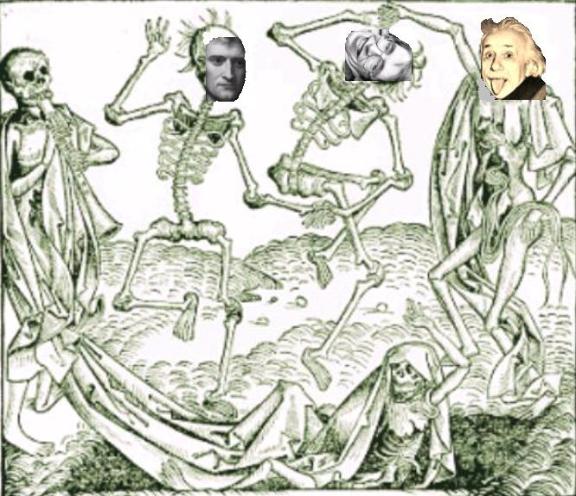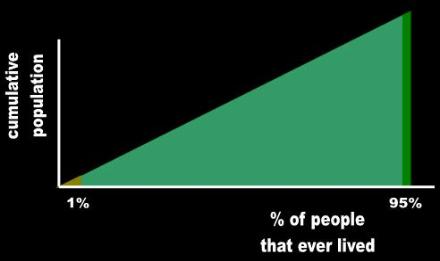| Adapted for the Internet from: Why God Doesn't Exist |
| The end of all things is at hand |
1.0 The Doomsday argument
Assume there are two bingo tumblers. One has 70 balls in it and the other one a trillion, but you don't know
which has which. You pull out one marble and it is the number 60. You must conclude that this is the tumbler
that has 70 balls. The odds of pulling such a low number on the first shot from the trillion-ball tumbler are next
to impossible. Now consider that the number of humans that will ever live is either 70 billion or 1 trillion. You
count how many humans have lived so far since the days of Lucy and conclude that 60 billion people have
already walked the Earth. You must likewise conclude that it is statistically unlikely that you form part of a small
percentage of all the people that will ever live. It is more probable that you are among the last humans on Earth
(Fig. 1).
An obvious counter-argument to Doomsday is that we don’t know how many humans will ever live or whether
there even is a limit. For all we know, we will trek to the stars in our high tech Enterprises and spread our seed
until it overflows space-time. Maybe Man is eternal.
A more fundamental point that the Doomsday Argument underscores is that the debaters on both sides
confuse Physics with Math. Newman and Palmer offer an impressive list of mathematical models, but have
no foolproof physical reason to back a single one of them. Should we count plants and viruses as well as
animals? Isn’t man an uninterrupted succession of individuals that extends all the way to the first cell in the
pre-Cambrian? So what date should we use as our starting point? Should we count Neanderthals if they
interbred with us? And what if we become immortal as post-humanists predict? Wouldn’t that reduce Gott’s
probability to zip? What if, as Leslie fears, we exchange the arsenal of bombs one day, but a few survive,
reproduce, and begin the Eden thing all over again? Will their descendants be laughing at Doomsday
predictions a hundred thousand years down the road? And then, again, the bombs may fly tomorrow
morning and this would also refute any probabilistic argument. Should we then start the Doomsday count
all over again?
Hence, any argument that you read against Gott’s Doomsday Argument is actually another refutation that
Math can serve as the language of Physics. Relativists don’t mind if you use Math to prove that space-time
exists, to demonstrate that you can travel to the past, or to show that light can’t escape black holes. They just
get upset if you use their number tool to tell them that they will die tomorrow morning.
Of course, I am not doing Doomsday any justice. The theory is more complex than what I have just described,
but the point is that mathematical calculations alone are irrelevant. Statistical arguments have just as much
probability of happening as of not happening. Mathematicians can perhaps calculate the probability that a
politician will press the button. They cannot tell us whether he will or for what reason. One is a mathematical
calculation based on speculative assumptions. The other one is a qualitative, physical occurrence. Until the
proponent can specifically define how man is going to meet his doom, probabilities are meaningless. And that
is in essence what detractors of Doomsday in so many words have been saying against the theory over the
years: we simply cannot use Math to decide such issues. The extinction of our species, if it is ever to occur, is
a purely qualitative issue.
And this is where we arrive at the Doomsday Argument's weakest point. We discover that, when push comes
to shove, the statisticians ultimately do not believe that our species will or can become extinct. Asked whether
our species will live forever, the mathematician intuitively answers that it won't or that it is highly unlikely. He
instantly brainstorms a list of mechanisms that can do us in at any moment now:
"the greatest existential risks are anthropogenic and arise, more specifically, from present
or anticipated future technological developments. Destructive uses of advanced molecular
nanotechnology, designer pathogens, future nuclear arms races, high-energy physics
experiments, and self-enhancing AI with an ill-conceived goal system" [1]
The first thing you note is that all of these mechanisms and agents have a built in loophole. None of them
guarantee the extinction of our species and thus enable the mathematicians to save face when push comes to
shove. The catastrophist is an individual who doesn't truly believe that Man will become extinct. He insinuates
it, but then always harbors in the back of his mind that someone, somewhere will survive and likely start the
race all over again albeit under more primitive conditions. In other words, the doomsayers just do all this math
as an excuse to justify drinking beer at the pub. Left to their logic, Man will live forever. Total extinction, you
know, like as in EVERY human being to the last man, is simply out of the question. At some point we reach
Adam and Eve and the whole thing starts all over again.
So for those of you who visit this site and expect a precise calculation, you will be sorely disillusioned.
I will not foretell a date and time of our extinction because such matters can never be predicted. You never
know when a devil’s advocate survives a few more minutes just to foil your prediction. I will do like the doctor
does. He does not tell you the exact day and hour in which you will die. He tells you that you have cancer and
that you are terminally ill. I will propose the physical mechanism by which intelligence and technology cannot
avoid extinction. The underlying thesis is that if man in all his wisdom and foresight cannot elude his fate,
neither can any other form of life. I will leave the task of calculating the exact date to the autistic bird-brains at
the mathematical asylum.
|

Hey guys! Remember that fellow named Bill Gaede? You know, the one
who predicted that we were NOT going to live forever. Ha, ha, ha, ha ha!
who predicted that we were NOT going to live forever. Ha, ha, ha, ha ha!

| Are you a member of the first percent of people that will ever live? If you are, then you are in a very special class of people. But the likelihood of this is highly improbable. On the other hand, if you are a member of say the first 95% of humans that will ever live, extinction is just around the corner. This mathematical theory only shows that we cannot infer the cause of the extinction of man (Physics) through statistics (Math). |

| B. Carter, The anthropic principle and its implications for biological evolution, Phil. Trans. R. S. 310 (1983) 347–363. J. Leslie, The End of the World, Routledge (1998). J. Gott, Implications of the Copernican principle for our future prospects, Nature 363, (1993) 315. |
- Module main page: Of catastrophists and doomslayers: Is Man going to live forever?
Pages in this module:
- 1. This page: Carter, Leslie, and Gott: The Doomsday Argument
2. Ehrlich, Bongaarts, and Coutts: Humans will overflow the planet
3. Hanson: We are running out of fuel
- ________________________________________________________________________________________
- Copyright © by Nila Gaede 2008